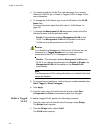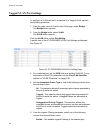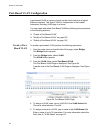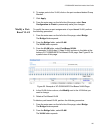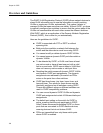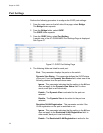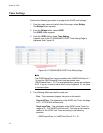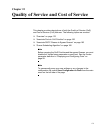
Chapter 14: GVRP
168
Overview and Guidelines
The GARP VLAN Registration Protocol (GVRP) allows network devices to
share VLAN information and to use the information to modify existing
VLANs or create new VLANs, automatically. This makes it easier to
manage VLANs that span more than one switch. Without GVRP, you have
to manually configure your switches to ensure that the various parts of the
VLANs can communicate with each other across the different switches.
With GVRP, which is an application of the Generic Attribute Registration
Protocol (GARP), this is done for you automatically.
Here are the guidelines for GVRP:
GVRP is supported with STP or RSTP or without
spanning tree.
Both ports the constitute a network link between the
switch and the other device must be running GVRP.
You cannot modify or delete dynamic GVRP VLANs.
You cannot remove dynamic GVRP ports from static or
dynamic VLANs.
To be detected by GVRP, a VLAN must have at least
one active node or have at least one port with a valid
link to an end node. GVRP cannot detect a VLAN that
does not have any active nodes or valid port links.
Resetting the switch erases all dynamic GVRP VLANs
and dynamic GVRP port assignments. The dynamic
assignments are relearned by the switch as PDUs
arrive on the ports from other switches.
GVRP has three timers: join timer, leave timer, and
leave all timer. The values for these timers must be
identically configured on all switches running GVRP.
Timers with different values on different switches can
result in GVRP compatibility problems.
You can convert dynamic GVRP VLANs and dynamic
GVRP port assignments to static VLANs and static port
assignments.
The default port setting on the switch for GVRP is
active, meaning that the ports participate in GVRP.
Allied Telesis recommends disabling GVRP on those
ports that are connected to GVRP-inactive devices,
meaning devices that do not feature GVRP.
PDUs are transmitted from only those switch ports
where GVRP is enabled.



